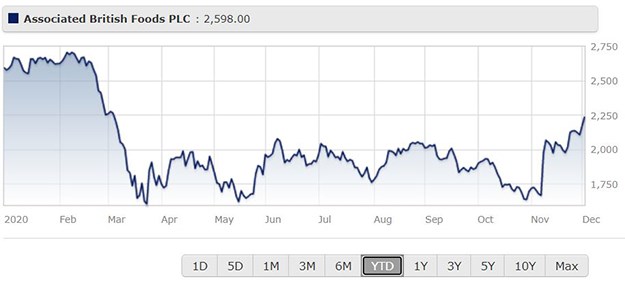
As high street shops in England re-open after the second lockdown, our stock of the week has a retail theme and our Twitter followers have chosen Primark owner Associated British Foods (ABF), ahead of Marks & Spencer (MKS) and Next (NXT).
With Topshop-owner Arcadia going into administration this week, life as a UK high street fashion retailer has never been harder. Months of lockdown have disrupted sales for those like Primark that depend on large and centrally located physical stores being open (the retailer famously doesn’t have a website where you can order clothes for home delivery). The company revealed that £600 million had been knocked off Primark’s profits and £2 billion of sales in the pandemic year; it’s hoping that extended opening hours will help sales catch up with lost time in the new financial year starting October 2020, helped by the easing of lockdown restrictions in the UK.
Beating Off Online Competition
Despite facing tough competition from online rivals such as ASOS (ASC) and Boohoo (BOO) and trading in an era of low customer loyalty across retail, Primark does have a band of loyal young fans – some of whom were prepared to camp out overnight for store re-openings this week.
But ABF is much more than a retailer of clothes and as its name suggests, it provides food ingredients such as sugar and yeast for baking products, which have been in high demand during lockdown as Britain’s army of amateur bakers cleared the shelves in the spring. Its consumer brands include Silver Spoon sugar, Kingsmill bread, Twinings tea.
Before Covid-19, the food division was often overshadowed by Primark, but the tables have turned this year, with profit margins rising in the grocery and sugar divisions. Still, retail dominates group revenues, contributing £5.8 billion compared with £3.5 billion for grocery, £1.5 billion from sugar, £1.5 billion from ingredients, and £1.4 billion from agriculture.
ABF's shares started the year around £26, fell off a cliff in the March meltdown, but have since recovered, especially on positive vaccine announcements in November. Morningstar analyst Ioannis Pontikis thinks the shares, at £22.50, are now trading just below their fair value of £23.50, offering a “margin of safety for patient investors”. In November, the company was one of the biggest gainers on the Morningstar UK index with a gain of 24% as investors swung back towards cyclical and consumer-sensitive stocks.

Pontikis says ABF’s recent full-year results, which showed a sharp fall in earnings, were as expected and Primark sales are expected to recover this and next year. He explains why Primark has been so effective in recent years but thinks a rival could copy this model: “Primark's differentiated business model calls for low prices, high volume, focus on a narrow range of collections and sizes, negligible advertising and marketing expenses, an upscale store experience, and virtually no online offering apart from a strong social media presence to drive store traffic.”
ABF is also one of many UK companies to scrap its dividend, which was 46.35p in the last financial year, a yield of around 2% on current share prices.
In ESG terms, Sustainalytics praises the company’s strong corporate governance but says the company is exposed to risks because it’s operating in the garment industry, which has been rocked by a number of scandals relating to worker rights. “ABF’s business is heavily reliant on suppliers based in countries that have been associated with poor working conditions and human rights issues, such as Africa, India, Bangladesh and Myanmar,” the ratings agency says. In the developed world, the food industry’s impact on health is also a hot topic and risks regulatory and government intervention: “The company faces the risks attached to the global obesity epidemic, largely attributable to the vast consumption of sugar globally, which triggered a recent wave of taxes on sugary products.”



























